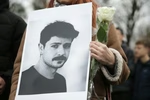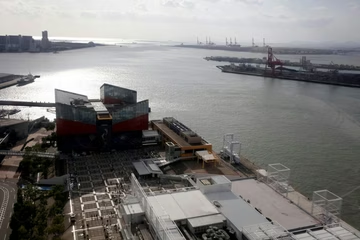
Bosnia and Herzegovina is bidding farewell to 2024 as yet another year of missed opportunities for the lasting stabilisation of political and social relations, despite the ruling coalition having promised accelerated reforms and progress towards EU membership at the start of the year.
The beginning of the year was promising. The parties that gained the majority of voters' trust in the 2022 general elections consolidated power and outlined the reforms and laws they would implement to make up for the delays of the past decade, with the aim of convincing European Union agencies and office-holders that the opening of accession negotiations should be approved.
EU membership was, in fact, the only common binding element of the diverse ruling coalition. In a country that remains deeply divided by visible, administrative, and invisible ethnic boundaries, its citizens continue to have completely opposing visions of the future. However, a convincing majority still wants Bosnia and Herzegovina to become part of European integration.
7 in 10 BiH citizens are in favour of joining EU
According to opinion polls conducted throughout 2024, over 71% of Bosnia and Herzegovina's citizens would vote in favour of joining the EU in a potential referendum, although this support varies across the entities. In the Federation of Bosnia and Herzegovina, more than 83% of citizens support membership, while in the Republika Srpska, just over 48% are in favour.
But at the very end of 2024, there are no indications that this will happen any time soon, as the country has once again been overwhelmed by old political conflicts, and the government is paralysed.
The main cause of this was the unusually long campaign leading up to the local elections held in October.
Political parties began their battle for votes with escalated rhetoric as early as the spring, and they did not stop until the conclusion of the elections.
In these elections, the Croatian Democratic Union of Bosnia and Herzegovina (HDZ BiH) and the Alliance of Independent Social Democrats (SNSD) of Milorad Dodik confirmed their absolute dominance over the Croatian and Serbian electorate, respectively, while the Party of Democratic Action (SDA) demonstrated that, despite being in opposition, it still enjoys significant support among Bosniaks and poses a serious threat to the status of the 'troika' – the Social Democratic Party of Bosnia and Herzegovina (SDP BiH), Our Party, and the People's and Justice Party (NiP), which are part of the ruling coalition.
October flash flooding resulting in 27 fatalities
In early October, Bosnia and Herzegovina was confronted with a natural disaster – flash floods hit parts of Herzegovina and central Bosnia, resulting in 27 fatalities and hundreds of buildings being destroyed. The total material damage was estimated at over 100 million euros. Croatia was among the first countries to respond, sending rescue teams and allocating ten million euros in aid to the victims."
Outgoing year marked by two trials of high-profile politicians
In January, the State Court of Bosnia and Herzegovina sentenced the former Prime Minister of the Federation of Bosnia and Herzegovina, Fadil Novalic (SDA), to four years in prison for abuse of office and authority related to the procurement of ventilators during the coronavirus pandemic.
Meanwhile, in February, the trial against the President of the Republic of Srpska, Milorad Dodik, began at the same court. He faces charges for disregarding decisions made by the High Representative.
The trials of these two high-profile politicians represent an attempt to prove that the judiciary in Bosnia and Herzegovina can be effective and hold high-ranking officials accountable when they break the law.
The outcome of Dodik’s trial, expected in 2025, could permanently determine the fate of this long-standing, unchallenged leader of Bosnian Serbs. A conviction in his case would result in an automatic removal from the position he holds.
This will carry particular weight in light of the continued secessionist threats pushed by this Bosnian Serb leader, who has repeatedly advocated for the secession of the Serb entity from Bosnia and Herzegovina and its unification with Serbia.
Because of such policies, the United States stepped up sanctions in 2024, targeting Dodik and individuals working with him. As a result, numerous companies linked to Dodik and his family were added to the "blacklist" of the U.S. Department of the Treasury, identified as covert financial backers of the RS leader and his family.
Old challenges in new year
Given the meagre results this year, Bosnia and Herzegovina will face the same old challenges in 2025.
The first and biggest will be how to ensure the opening of EU accession negotiations, and the second will be how to reduce political tensions and avoid new wrangling among key politicians representing the country’s three constituent peoples.
Croats in Bosnia and Herzegovina will continue to push for electoral reform, given that the general elections are scheduled for 2026 and a deadline for the amendment expires before 2026.
The upcoming year is expected to be marked by two symbolically significant anniversaries.
In July 2025, it will be 30 years since the genocide in Srebrenica, and in November, three decades will have passed since the signing of the Dayton Agreement, which forms the basis of present-day Bosnia and Herzegovina.
These events will provide impetus for another reassessment of the international community’s relationship with Bosnia and Herzegovina.
7 in 10 BiH citizens are in favour of joining EU
October flash flooding resulting in 27 fatalities
Outgoing year marked by two trials of high-profile politicians
Old challenges in new year
Kakvo je tvoje mišljenje o ovome?
Učestvuj u diskusiji ili pročitaj komentare





 Srbija
Srbija
 Hrvatska
Hrvatska
 Slovenija
Slovenija



























































